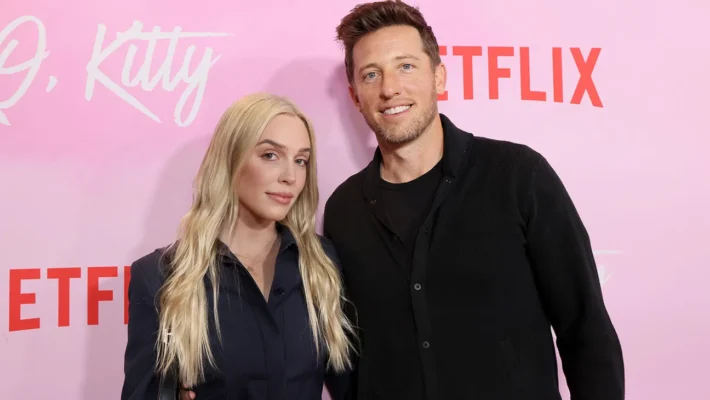In the digital age of content creation, few podcasts have made as significant an impact as “Call Her Daddy.” Launched in 2018, this podcast initially targeted a niche audience but soon skyrocketed into mainstream success, transforming the landscape of modern media and influencing a generation. Behind the glossy veneer of humor and candor lies a story rich with conflict, ambition, and the quest for authenticity. In this blog post, we will explore the evolution of “Call Her Daddy,” the key players involved, the controversies that punctuated its journey, and the lessons it imparts about navigating success in the modern media environment.

Origins of “Call Her Daddy”
“Call Her Daddy” began as a podcast hosted by Alexandra Cooper and Sofia Franklyn, two twenty-something friends and roommates living in New York City. The show emerged from their shared experiences, particularly revolving around relationships, sexual exploration, and femininity. They approached these topics with a combination of humor, candor, and unabashed honesty, creating an engaging listening experience that resonated with many young listeners.
The podcast’s title itself is a reflection of its cheeky and playful approach, inviting listeners to engage with the often-taboo topics surrounding dating, sexuality, and personal empowerment. Its early episodes gained traction through word-of-mouth and the hosts’ social media presence, allowing it to quickly build a loyal following. By 2020, “Call Her Daddy” had transformed into a cultural phenomenon, with millions of downloads each week and a dedicated fanbase.
The Conflict: A Fateful Split
However, as is often the case with meteoric rises in popularity, internal conflict was lurking beneath the surface. In mid-2020, tensions between Cooper and Franklyn escalated, leading to a very public fallout. The dispute revolved primarily around contractual issues and ownership rights of the podcast—a scenario not uncommon in the entertainment industry but one that highlighted the challenges faced by creators in maintaining autonomy over their intellectual property.
As the situation unfolded, listeners found themselves entrenched in a real-life drama that played out on various media platforms. Many were shocked to learn that the podcast was under the umbrella of Barstool Sports, a controversial media company known for its strong brand identity and outspoken approach. The friction culminated in a highly publicized negotiation process that saw Cooper ultimately taking the reins of the podcast while Franklyn stepped away.
In an industry where collaboration is often praised, the split highlighted the complexities of partnerships, especially in high-stakes situations. There are lessons to be gleaned here about the harsh realities of creative endeavors—where individual ambitions, financial agreements, and personal relationships can intersect in unpredictable ways.

Cooper’s Evolution as a Solo Host
Following the split, Alexandra Cooper emerged as the sole host of “Call Her Daddy.” Many speculated whether the podcast could maintain its success without the collaborative energy that had initially driven it. However, Cooper leveraged her newfound independence and focused on her identity as a content creator. She took this opportunity to delve deeper into her personal narratives, pivoting towards more profound discussions about self-discovery, mental health, and empowerment, while keeping the podcast’s signature humor intact.
The show’s rejuvenated format captured the attention of audiences eager for depth alongside the light-hearted banter, reinforcing its place in popular culture. Nowadays, Cooper is seen not only as a podcast host but also as a savvy businesswoman and influencer, carving out her niche in a highly competitive industry.
The Financial Ascent
“Call Her Daddy” also marked a significant turning point in the monetization of podcasts. Following the split, Cooper signed a lucrative deal with Spotify reportedly worth $60 million, one of the largest podcasting contracts ever signed to that point. This deal underscored the shifting landscape of digital media, where successful podcasts began to be recognized as valuable intellectual property.
This transformative moment shines a light on the monetization options available to content creators today. From sponsorships and advertising to merchandise and subscription models, the possibilities for generating revenue are vast. The “Call Her Daddy” journey illustrates that financial success is attainable through strategic negotiations, understanding audience engagement, and building a strong personal brand.

Cultural Impact and Audience Engagement
The influence of “Call Her Daddy” extends beyond just its listenership; it has also ignited conversations about women’s empowerment, sexuality, and relationships. Cooper’s ability to discuss topics that many find difficult to voice has created a safe space for listeners, allowing them to relate to her stories and experiences.
Moreover, the show’s audience engagement has received acclaim; Cooper actively interacts with fans through social media, incorporating listener feedback into episodes and discussions. This approach fosters a sense of community among listeners and deepens their connection to the content.
Beyond empowering women, “Call Her Daddy” has attracted a diverse listener demographic, breaking boundaries and inviting open dialogues about sexuality, relationships, mental health, and personal growth. This dynamic has positioned the show not only as a podcast but as a cultural touchstone, influencing many other creators and paving the way for future discussions in the digital space.
Lessons Learned
The story of “Call Her Daddy” carries valuable lessons for aspiring content creators and those navigating the complexities of partnerships. Here are a few key takeaways:
Ownership is Crucial: Understanding and securing rights to your intellectual property is fundamental. Clear contracts can prevent misunderstandings and conflicts between partners.
Adaptability: The ability to pivot and redefine your brand is critical in sustaining long-term success. When faced with challenges, learning to adapt can help you encompass broader themes and retain your audience’s interest.
Engagement Over Entertainment: In the age of digital media, building a community around your content is essential. Engaging authentically with your audience fosters loyalty and creates a sense of belonging.
Business Savvy: Understanding the commercial aspects of content creation, including monetization strategies and partnerships, is vital for long-term sustainability. Knowledge of business dynamics can empower creators to thrive in competitive environments.
“Call Her Daddy” stands as a testament to the evolving landscape of podcasting and media in general. Its journey, marked by conflict and triumph, reminds creators that behind every successful brand lies a complex web of challenges and opportunities. The podcast offers a blueprint for modern media success, emphasizing the importance of authenticity, engagement, and business acumen in achieving one’s creative aspirations.
As the podcast continues to grow and reshape narratives around femininity and empowerment, listeners can only wait in anticipation for what lies ahead for Cooper and her evolving journey—after all, she’s proven time and again that success is not just about the top but about how she gets there, together with her audience.

